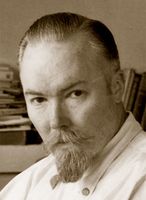Roerich, G.: Difference between revisions
No edit summary |
m (Text replacement - "{{DRL Authors of English Works}}" to "") |
||
| (2 intermediate revisions by 2 users not shown) | |||
| Line 2: | Line 2: | ||
|pagename=Roerich, G. | |pagename=Roerich, G. | ||
|PersonType=Authors of English Works | |PersonType=Authors of English Works | ||
|images=File:Roerich George wiki.jpg | |||
|HasDrlPage=Yes | |HasDrlPage=Yes | ||
|HasLibPage=Yes | |HasLibPage=Yes | ||
| Line 26: | Line 27: | ||
== Publications == | == Publications == | ||
Latest revision as of 09:30, 7 June 2024
| PersonType | Category:Authors of English Works |
|---|---|
| MainNamePhon | George N. Roerich |
| bio | George Nicolas de Roerich was a prominent 20th century Tibetologist. His name at birth was Yuri Nikolaevich Rerikh. George's work encompassed many areas of Tibetan studies, but in particular he is known for his contributions to Tibetan dialectology, his monumental translation of the Blue Annals, and his 11-volume Tibetan-Russian-English dictionary (published posthumously). George was the son of the painter and explorer Nicholas Roerich and Helena Roerich. (Source Accessed March 4, 2020) |
| YearBirth | 1902 |
| YearDeath | 1960 |
| BornIn | Okoulovka, Novgorod Province, Russia |
| associatedwebsite | http://irmtkullu.com/the-roerich-family/george-roerich/ |
| education | M.A. in Indian Philology, Paris University in Sorbonne;
B.A. and M.A., Harvard University |
| IsInGyatsa | No |
| Other wikis |
If the page does not yet exist on the remote wiki, you can paste the tag |
Full Name
George N. Roerich
Affiliation
Education
Other Information
George Roerich is one of the greatest orientalists, linguists, and encyclopedists of the 20th century, and his name is known in many countries around the world. He spoke fluently more than 30 European and Asian languages and dialects, was a brilliant expert in Eastern culture, religion and philosophy. He also represented that synthetic trend in Oriental Studies in which Russia could justly take pride. Source

